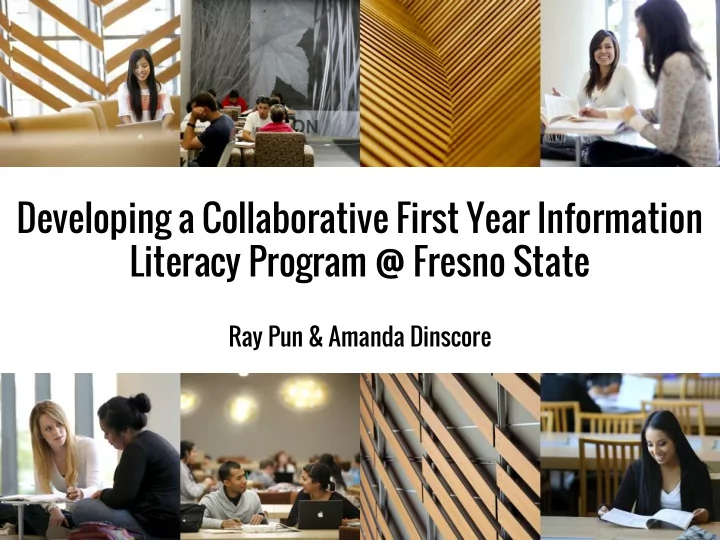

Developing a Collaborative First Year Information Literacy Program @ Fresno State Ray Pun & Amanda Dinscore
Introductions Ray Pun First Year Student Success Librarian Amanda Dinscore Research Services Coordinator
Challenges/Context ● ~24,000 FTE -- 21,000 undergraduates ● First Year Writing Program alone enrolls 1,400+/year ● More than two-thirds are the first in their families to attend college ● Only 43% of entering first-generation freshmen graduate within 6 years
History of Collaboration with the First Year Writing Program ● 2008 - no library workshops for first-year classes, general tutorials only ● Frustration, dissatisfaction - needed to develop a better working relationship ● Worked together to develop a customized tutorial
History of Collaboration with the First Year Writing Program - cont’d ● Customized tutorial ● F2F instruction ● Instructor training & consultation ● LibGuides ● Course redesign grant
● Blog - collaborative content development ● Writing & discussion assignments ● Pilot showed demonstrated increase in IL skills
What worked... ● Collaboration ● Instructor choice ● Easily updated ● Blackboard integration ● More F2F interactions (students & instructors) & increased approachability
What we could do better... ● Assessment ● Consistency ● Relevance to other disciplines in addition to writing
First Year Information Literacy Project in 3 Phases: FYIL Pilot and Tutorial Advisory Development Assessment Group In progress
First Year Information Literacy Advisory Group (FYILAG) Building Consensus Across Campus ● First Year Writing Program ● University 1 ● First Year Communications Classes ● Writing Center
● Developing effective outcomes that can be easily Learning Outcomes assessed & are relevant & engaging ● Challenges: Audience Members - do you know your audience members - for faculty, students or for ourselves? ● Introducing & mapping out ACRL’s new Framework with our learning outcomes
Forming a First Year Student Group ● Assess current learning outcomes - what do they mean to them? ● Any questions or specific concepts they do not understand? ● Build better relationships with students
MODULE 1 : Developing Your Research Question Develop a research question that is meaningful to you and to the larger community you belong to, can be supported by evidence, and can be seen from different points of view. MODULE 2: What You Need to Know & Where to Find It Figure out what information you need to answer questions that come up in your research and know where to go to find that information.
MODULE 3: Learning to Search Learn how to search for the different types of information you need using a wide variety of research tools. MODULE 4: Evaluating Your Sources Determine whether or not the sources you find are current, relevant, authoritative, accurate and good to use for your research. MODULE 5: Giving Credit Give credit to the sources you use for your research according to academic standards.
Collaboration with the Writing Center
Tutorial Development - What We Wanted ● Options for formative assessment ● Flexibility - flipped classroom, group work, etc... ● Adaptability - especially for integration into a variety of course types ● Ease of use ● Scalable and sustainable ● Ability to embed videos, audio, images, etc...
Next Steps... ● Piloting and revising the modules with selected classes: First Year Writing, Communications and University 1 ● Roll out in Spring 2017
Questions? Raymond Pun ray.pun@csufresno.edu Amanda Dinscore adinscore@csufresno.edu
Discussion Question 1 Identify some of the stakeholders at your institution that you could partner with to develop information literacy learning outcomes, projects, or programs.
Discussion Question 2 What challenges do you foresee in forming such partnerships?
Discussion Question 3 How have you shared the IL Framework with your campus partners?
Recommend
More recommend